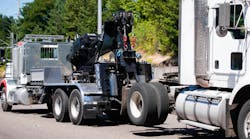The latest HOS rules aren't perfect, but they may be good enough It's been 12 years since federal regulators introduced the first significant overhaul of hours-of-service rules in six decades. Between changes in administration, court suits, countersuits and general hullaballoo, we still don't have a final final rule in effect and won't until 2013. Maybe. There's a good likelihood that someone will challenge this latest set of HOS modifications in the courts, postponing their implementation yet again. As with any good compromise, neither trucking industry lobbying groups nor the self-appointed safety advocates are pleased with every detail of the Federal Motor Carrier Administration's (FMCSA) most recent attempt to play Solomon. Share inShare Article Tools Bookmark Email Reprint Save Print Comment Advertisement Advertisement Penton Media - Fleet Owner, Click Here! Groups that monitor truck-safety issues (which some in trucking accuse of secretly representing railroad interests) are unhappy that FMCSA didn't cut daily on-duty time for drivers from 11 hours to 10. At press time, the Teamsters were still “evaluating” the newest HOS changes and determining their “next course of action.” Given their history of court challenges to the 11-hour day, it's a pretty good bet that course will include another suit. It's no surprise that industry advocates like the American Trucking Assns. (ATA) and business groups like the National Retail Federation are pleased that FMCSA has retained the 11-hour driving day. But also not unexpectedly, they have their own complaints about the new changes. Specifically, they object to a change in the 34-hour reset provision, which would now require a driver to include two consecutive 1 to 5 a.m. periods in that weekly mandated rest time. Admittedly I'm just an observer on the sidelines, but it seems to me that FMCSA managed to avoid the one change that would have really damaged trucking — the 10-hour driving day — but felt they had to mollify proponents of the shorter work hours with a bone, hence the two-night restart change. It was their attempt to sort of please both without doing anything that would result in radical changes to truck operations and productivity. On the whole, I think fleets ought to be relieved. Think about the impact of reducing driving time by one hour a day. Yes, the two-night reset requirement will cause problems for some long-haul truckload carriers, but given the wide range of operations subject to HOS, they should be relatively minor for trucking as a whole and for the most part handled by more careful dispatch. As for the argument made by ATA and others that the 1 to 5 a.m. stipulation will mean additional congestion during the morning's peak traffic time, I just don't buy it as a significant problem, or one that won't be minimized by smart fleet managers. And while the science behind current HOS rules is certainly open to criticism as less than conclusive, it is widely accepted that sleep during those late night hours is important to fighting chronic fatigue. In the interest of finally putting HOS to rest, it might be time to embrace FMCSA's newest attempt to comply with a court-ordered review of these issues. Their response may not be perfect, but it offers workable rules that just may be good enough at balancing driver alertness and business requirements to survive further court and congressional challenges. After a dozen years of uncertainty, trucking needs to have stable rules not subject to sudden changes initiated by court challenges and political pressure.
Voice your opinion!
Voice your opinion!
To join the conversation, and become an exclusive member of FleetOwner, create an account today!
Latest from News
Latest from News


